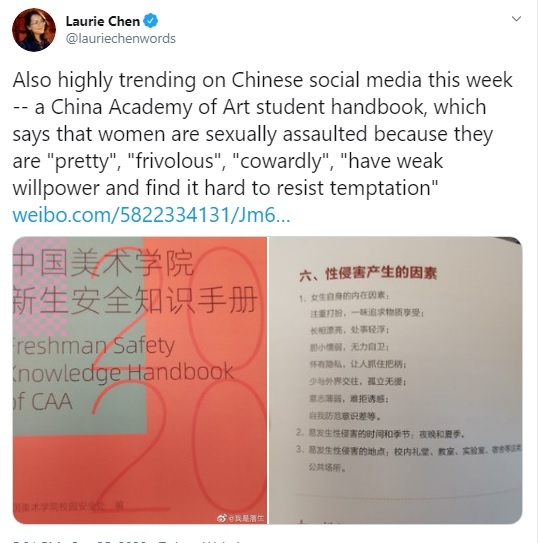A Chinese university handbook, which was supposed to be a safety guide for new students, has caused massive online criticism for its content that said the women were raped because they "find it hard to resist temptation."
The book which was published by the China Academy of Art warns of the risk of facing sexual assault issues in places like campus, classrooms, and dormitories. But after an excerpt was published online it has drawn furious criticism on social media this week.
As per the social media posts by many people, the sexist content said that women fell victim to rape as "they are pretty and handle matters frivolously, are cowardly and powerless to defend themselves... have weak willpower."

The Controversial Book
As per the book, women love to wear "nice clothes and lead a materialistic lifestyle." After the content came under scrutiny, the university faced a massive backlash from Chinese social media users who expressed their outrage online.
One of those furious online commentators wrote, "Even if a woman runs naked, it is not a reason for rape by a rapist." The user added that a criminal is a criminal, and they need to be punished. "Don't make any argument that the victim is guilty," said the user, while another commentator stated that "it's already the 21st century, this is back to a feudal society."
But the criticism did not affect the fine-arts academy in Hangzhou, as a staffer said on Friday, September 25 the pages posted online had been "quoted out of context" and added that "We are not discriminating against women."
Earlier this month another similar incident sparked online outrage after Guangxi University in southern China issued guidelines which warned female students not to wear "revealing" outfits when they are inside the campus "to prevent arousing temptation."
Sexual Harassment in China
China has introduced a civil code this year in May, expanding the definition of sexual harassment. It provides another reminder that even as workplaces focus on virtual workforce, social distancing, and other legal issues, workplace respect and inclusion is essential to achieve a well-functioning work environment.
During the #MeToo movement, many cases came under the spotlight from several countries including China, where a university student accused a professor and he was then removed from his teaching position. There were other Chinese women who also joined the movement and talked about sexual harassment committed by other respected male figures.









